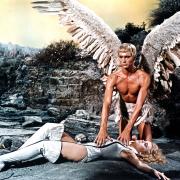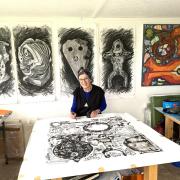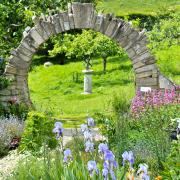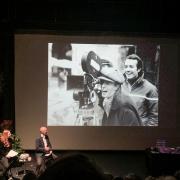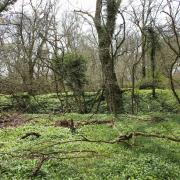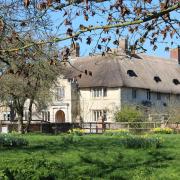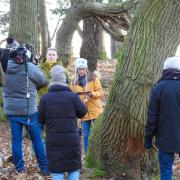As famous for his musical talent as his love affairs with high society beauties, cabaret star Leslie Hutchinson was the inspiration for Downton Abbey’s Jack Ross. Now his daughter wants the series’ creator Julian Fellowes to immortalise her father in film

The Downton Abbey Christmas Special has fast become television’s new Queen’s Speech, as fundamental to the festivities as goose fat, sprouts and comedy knitwear. This year’s heady finale centres on the will-they-won’t-they romance between Lady Rose and her charismatic jazz singer lover, Jack Ross.
Dorset’s Downton creator Julian Fellowes has always prided himself on drawing his plots from real life. And Ross – based on Twenties cabaret star Leslie “Hutch” Hutchinson - is no exception.
Hutch was absurdly glamorous, hugely talented and impossibly handsome: the highest-paid star of the era. He wore only Savile Row suits, owned a chauffeur-driven Rolls Royce, rode to hounds and spoke like an aristocrat.
And, despite the fact that he was black, born in Grenada – in a bigoted, bygone age – he was hotly embraced by Britain’s social elite. Men admired him – the Prince of Wales was his greatest fan. Women adored him.
Indeed, his affair with Edwina Mountbatten - mirrored by Ross’s frowned-upon relationship with Rose - caused a High Court libel sensation.
But though Hutch was, undeniably, a philanderer extraordinaire, there was much more to the man who, according to one eyewitness, “could inject more sex into one bar of music than most people in a lifetime.”
And Gabrielle Markes – one of Hutch’s nine known illegitimate children – should know. The 83-year-old, who now lives in Dorchester, says: “Everyone always goes on about the sex – and Hutch was very good looking. But he was also an incredibly talented musician.”
Gabrielle is keen to make a film based on her father’s colourful life. She recently approached Fellowes.
“I asked him if he’d based Ross on Hutch. And he said ‘of course’. So I went further and asked if he’d be willing to write a script. He just said: ‘I’m too busy right now but come back to me in three years’.”
Hutch died penniless in 1969, aged 69. Ultimately ostracised by the royals after his affair with Lady Mountbatten soured, his career was starved of oxygen. The orders from the top were clear: no Royal Command Performance, no BBC airplay.
By the mid-40s, he was struggling to make ends meet, singing for pennies at a restaurant in Trafalgar Square while Edwina – her marriage patched up - had become the all-powerful Vicereine of India.
But though Gabrielle proudly owns all her father’s records and has spent years tirelessly researching his life, she never actually met him – or her mother, Elisabeth Sperling.
“She was a young debutante. And he was this huge star. All the women threw themselves at him and he’d invite them in. I don’t know whether they had a one-night stand or an affair but there she was – in the early 1930s and three months pregnant. An unmarried mother back then? That just wasn’t happening. So she got married, quickly, to an Army officer, keeping the baby a secret.
“But finally she had to tell him – they were both white, you see: ‘Look, I don’t know what this baby’s going to look like.’ It must have all come out because they hired a private midwife who owned her own London nursing home.
“She came and delivered the baby and then was asked to take me away pending adoption. But no one wanted to adopt me so I went on living with her. And when I was 10, this woman – Miss Markes as I always called her - finally adopted me herself. She was 50.”
Gabrielle, who went on to train as a nurse, clearly has a forensic intelligence. After her adoptive mother died in 1972, she found her birth records in a long-forgotten filing cabinet. She has since tracked down her long list of half-siblings – the youngest was born in 1964, just five years before Hutch’s death.
And though she never met her birth mother – she died in 1992 – she did learn more about her.
“After settling with her new husband in Egypt and giving birth to a second child, Judith, she ran off with another man while her husband was on exercises. She fled back to England with this man, leaving Judith in a cot. I finally found Judith – she lives in Oxford now, a year younger than me – and it turns out she never knew our mother either.
“All we know about what became of her is that she moved to the Midlands and became a magistrate.”
Gabrielle is remarkably sanguine about her absent father. “I don’t feel angry - he was who he was. He came from Grenada and all the men there still have what they call their outside women. Mostly, I’m impressed that he came here, when racism was rife, and fought the system, succeeding against all the odds.”
Gabrielle also takes comfort from the fact that her father’s musical talent has been passed on.
“I play the piano and of the other eight half-siblings I’ve found, three of them are musicians – a professional singer, a chorister and a Dominican monk who plays the violin exquisitely. And we all get on beautifully.”
So what was it about Hutch that made him such a magnetic character?
“He was just so charismatic. But it was a hard slog. He had to start with nothing. He was supposed to be a doctor but gave up studying medicine in New York after a year.
“His father was furious but Hutch ended up in Harlem, where it was all happening, the favourite haunt of aristocracy. He ended up being introduced to the Vanderbilts and he ruthlessly climbed the ladder.”
Hutch moved to Paris to further his musical career before arriving in London in 1927. He made his West End debut in One Dam’ Thing After Another, a lavish revue with costumes designed by Coco Chanel.
Prejudice still gripped mainstream Britain. Hutch could perform in a top London hotel but he couldn’t walk through the front door or even stay the night. And although the reviews were ecstatic, Variety magazine made no mention of his name. He may have been brilliant, but he was black. Those were the mores of the time. But mores seldom apply to the upper classes.
At the first night of One Dam’ Thing, the starry audience included the Prince of Wales, his cousin Lord Louis Mountbatten and his wife, Edwina.
The grand-daughter of King Edward VII’s banker Sir Ernest Cassel, Lady Mountbatten was wildly rich and equally spirited. What Edwina wanted, Edwina got. And that clearly included the handsome singer she was introduced to at the after-show party. Their affair was to last for four years.
“They were so blatant it was almost bound to end up in a court case,” says Gabrielle. “Even then, Edwina perjured herself, denying she had ever met ‘anyone like that’. But in those days, if a lady said something, it was true.”
The hearing marked the beginning of the end for Hutch.
“After that, Buckingham Palace said
Hutch was not to be promoted in any way.”
But the royals – despite turning their backs – never forgot Hutch.
“When he died, he’d been ill, poor and impoverished,” says Gabrielle. “There was barely money left to bury him at Highgate Cemetery. But the funeral directors were astonished when Lord Mountbatten rang and insisted on paying for the headstone.”
So will Gabrielle be watching on Christmas Day to see what becomes of her father’s TV double, Jack Ross?
“Of course,” she says.








